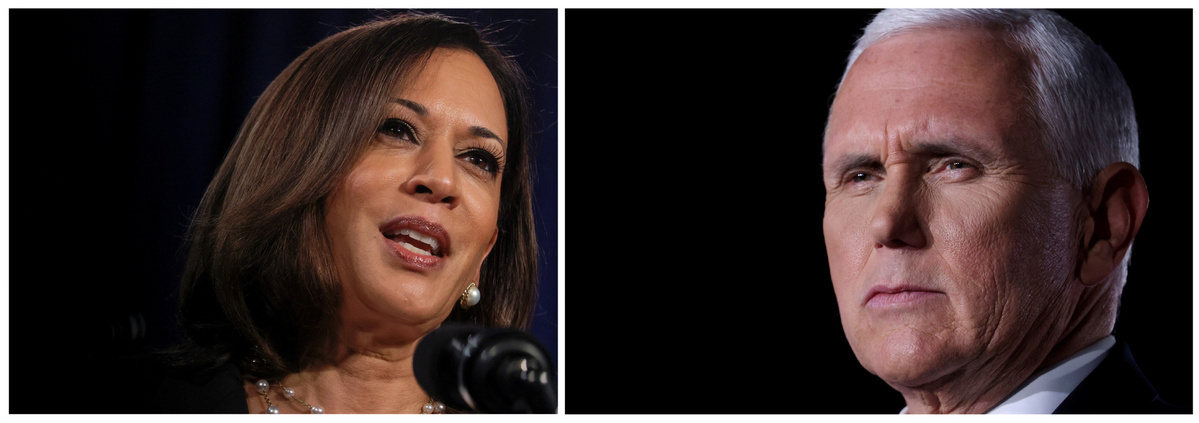
FILE PHOTO: A combination picture shows democratic US vice presidential nominee Kamala Harris delivering a campaign speech in Washington, US, August 27, 2020, and US Vice President Mike Pence looking on while delivering his acceptance speech as the 2020 Republican vice presidential nominee during an event of the 2020 Republican National Convention held at Fort McHenry in Baltimore, Maryland, US, August 26, 2020. (Photo: Agencies)
Vice-President Mike Pence and Democratic challenger California Senator Kamala Harris will be separated by plexiglass dividers when they debate in Salt Lake City on Wednesday night, a reminder of how the coronavirus pandemic is reshaping the presidential campaign and roiling life in the country.
The debate has taken on added importance after the first face-off between President Donald Trump and Democratic nominee Joe Biden, both in their 70s, was chaotic and uninformative, some experts have said.
"Vice-presidential debates don't usually effect the broader race, but this is an unusual election cycle, so this debate is being closely watched," said Cal Jillson, a political scientist and historian at Southern Methodist University in Dallas.
These debates tend to be derivative since the vice-president candidates aren't explaining their own views so much as they are explaining and defending the views of their presidential candidate and campaign, he said.
"This particular debate is more important than most because the first presidential debate was so uninformative and it is not entirely clear that the two remaining presidential debates will actually be held, given all the uncertainly around COVID," Jillson told China Daily.
The first US presidential debate on Sept 29 saw Trump and Biden spar over the Supreme Court, the coronavirus, the economy and election integrity in a 95-minute clash marked by many interruptions, especially by Trump, and sometimes personal attacks.
The vice-presidential debate is unlikely to be as chaotic, but debaters could face no easier challenge.
Pence, 61, will have the more difficult task as his Republican ticket is running behind and even losing ground in recent days, according to Jillson.
A Wall Street Journal/NBC News poll conducted after the first presidential debate last Tuesday and released on Sunday found that Biden leads the president, 53 percent to 39 percent, among registered voters.
"Pence has to try to stabilize the Republican campaign and that is a tall order for a vice presidential candidate," Jillson said. Kamala Harris, 55, is the first woman of color on a major ticket and newer on the national stage.
The viewers of the debate will be asking themselves whether she could step in should former vice-president Biden be unable to complete his term if elected, according to Jillson.
In addition, Republicans are trying to plant the idea that Biden is unsteady, and that Harris is unready. She has to rebut that by her performance, he said.
William Banks, distinguished professor emeritus at Syracuse University College of Law in New York, said both candidates will try to impress voters that they and their presidential candidates have the better policy positions for the future.
"Pence will be less extreme and boastful than his boss, and Harris will likely be more combative than hers," Banks told China Daily.
Banks also said that Trump's coronavirus illness raises the profile of this debate, but only by a little, and that the vice-presidential debate is "highly unlikely" to shift the race.
After spending three days in a hospital for COVID-19 treatment, Trump returned Monday evening to the White House, where the outbreak seems to be widened with senior White House adviser Stephen Miller being the latest to test positive for coronavirus on Tuesday.
John Hudak, deputy director of the Center for Effective Public Management at the Brookings Institution, argued that the Pence-Harris faceoff was the most important of its kind since vice-presidential debates began 40 years ago.
Whether Trump is re-elected or Biden wins next month, they will be sworn in during a deadly pandemic that has proved to be particularly dangerous to older men.
"Americans will be watching the VP debate with renewed awareness that one of those two individuals could easily become president—not because they ran for the office but because they succeeded to the office," Hudak said.
Two more presidential debates are set for Oct 15 and 22.


